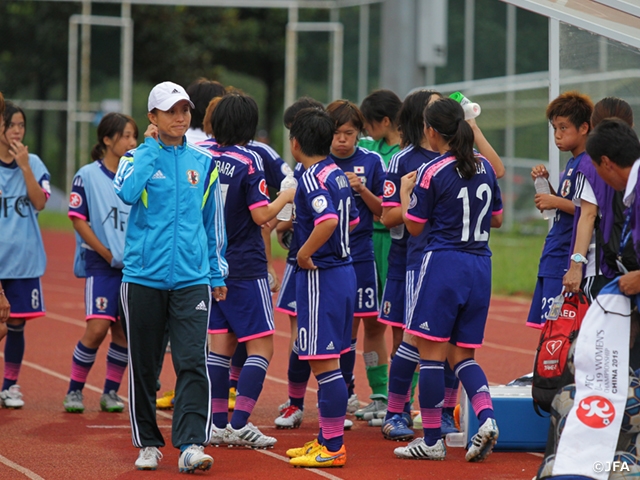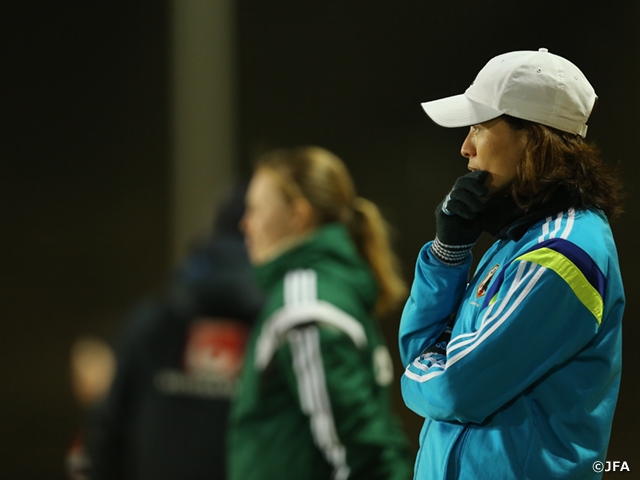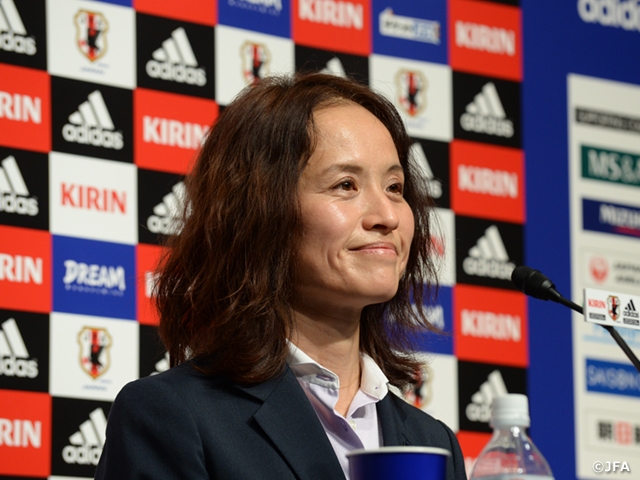NEWS
Interview Part 2: New Nadeshiko Japan coach TAKAKURA Asako expects players to open up the way to go further with their ability to think
01 June 2016

Nadeshiko Japan (Japan Women’s National Team) appointed TAKAKURA Asako as the new Coach. She has watched the current trends of women’s football internationally as a member of the Technical Study Group of FIFA and AFC, while coaching underage categories of teams.
Since she has learned the world level of women’s football from her experiences, she raised some criteria for selecting squad players: “players with skill, cleverness, ability to keep running, sense of dedication to work hard for the team, and strong passion to be called up to be a squad member”. She also mentioned that players’ ages are not taken into consideration. What is the future trend and detailed conditions for the squad members in the new Nadeshiko coach’s eyes? This is the second part of our interview with her.
Q: What is your perspective on the recent change in world’s women’s football?
The women’s football market in the world has grown larger and larger; for example, women’s football is not very popular in Canada, but the number of audience of the FIFA Women’s World Cup in Canada last year jumped up compared to the number of the previous world cup. As PR budget increases, the world’s tension to promote women’s football is also getting more serious. Considering this situation, the world’s attention towards the FIFA Women’s World Cup in 2019 will be much bigger and I strongly feel that we have to do more.
Other countries have improved; apart from Germany and USA, France has become stronger year by year and so have all of the other countries. Southern American countries for instance, they should quickly become stronger once they become serious due to their football culture. In Asia, there is a small gap between the 5 strong countries and the others, but we never know how the situation will be in the future. Situations in football can be changed so quickly, so what is very important for the next 5 years is what kind of effort football associations and each domestic league can do.
Q: What is the world’s trend in play itself? Is there any aspect in which Japan needs to be stronger?
There is no doubt about the general level of women’s football has improved drastically. There are more teams which can reach up to a decent level and this means that other countries who are trying to strengthen women’s football also have opportunities to be stronger.
The physical level is now higher; in fact I feel the level has increased considerably by judging players’ running, the speed at which matches are played, kick distances, and the sound when players tackle each other. In the past, I used to find femininity in the players’ lack of speed and movement when I was watching their matches on TV. Now I find it surprising to see their play has levelled up enough to feel “is this women’s football?!” Regarding the quality of play such as techniques in moving or stopping the ball simply, I think Japan is better than the other countries, and they have a sort of distinctive character which comes from their careful playing style with more consideration to the other players.
I think this is affected by Japanese culture; queuing up neatly, tidying up well, and giving away things with patience even in disaster situations due to earthquakes. No talking a lot and keeping yourself inside to collaborate well with the others. I think Japanese people have stronger mentality in contributing something to others from behind for example to protect your family with strong sense of care and passion.
Q: Do you think this mentality reflects on Nadeshiko Japan?
I can find it from how Nadeshiko Japan plays on the pitch. They don’t show off individualities, since their beauty is found in the attitude that they work hard for others. Even if you cannot shine, you may still enjoy more when you can work for your team to achieve one goal together with them.
In Japan, there isn’t any risk of finishing any competition without rebuilding up the team mentally which is caused by poor teamwork. They could get victories with good teamwork in the latest world cup in Canada and another one in Germany in 2011. They consistently play and grab any chance to score, and in the end they get victories. They don’t give up and just keep playing. I think there aren’t any other teams like Japan.
In tactics, USA and Germany changed their play style from kicking the ball frequently to keeping the ball more. Especially, USA tends to take this style since Japan won the title, and the trend of women’s football changed. In defence, now many teams apply compact and organisational defence style. At the same time, there are the characteristics that only Japanese players can achieve; not everyone can imitate what Japan does just by importing Japanese training methods. In improving quality and detailed plays, Japan can do more chasing details.

Q: What do you require for players?
In any age groups, I never want to allow players to do self-centred behavior or make plays which undermine the quality of team. This leads to one of my conditions in selecting squad member; “a sense of dedication to work hard for the team.” I will keep calling up the players who can perform well on the pitch, keeping the team’s rules strictly. If they can’t do, I will stop selecting them from next time. At the same time, I am interested in what the players think and what they have seen in their career as a player; they should have strong guts by playing in front of tens of thousands audiences, so I would like to consider these aspects when I select players.
I will tell them everything that I can, and I will do my best for the team. Yet, I want players to think well about what to do to play better and to express their advantages well by themselves; only they can overcome challenges to get good results. I always expect them to open-up their way even though they have to bump into challenges and suffer. I open the door to anybody, so I want them to come and grab the opportunity.
Q: You said that you expect the team to be able to judge the situation well on the pitch at the press conference when you signed. “Think” is the key for the team.
I have included “techniques and cleverness” into the criteria to select squad members. Cleverness is the ability to think about things on their own. In football, you have to choose the best option in a very fast-changing situation. Since you have to express what you chose using your body, they have to build up their fitness as a world-top athlete. They are also required to have various techniques to break through any difficulties and a good sense of teamwork is crucial.
The ability to think is also necessary even off the pitch; you need to think about what to do for 20-30 teammates to stay in a good mood. The team can be built up with this type of consideration. Assistant Coach OBE’s and my role is to point the players in the right direction to go and the players are the ones who have to get there.
Suppose the team is an orchestra, I will let them perform in whatever way they want, and then I’ll see what kind of sound can be done with which kind of combination. I am looking forward to seeing in which direction the team will go. I wait for the players to appeal their characters as players. In the end, I will select the players who have a strong passion to play as a Nadeshiko player on the pitch.

Q: What do you want to do first for Nadeshiko Japan to play well in the world?
I want them to play with a sense of “one step further” in both defence and offence. If they don’t pay attention to improving themselves, the team will get stuck and become weaker. It is important to play with confidence, yet it is also important to be hungry; in the final qualifier of the Rio de Janeiro Olympic Games, the players might not be able to express their play well, but I want to find out what was missing to sort out the issues through working hard as a team.
In stealing the ball in defence, I want them to share a clear mind to see when to attack with all of their strengths, or to see when to wait. In offence, I want them to play as they want to some degree, so I wouldn’t make a big rule but understand well each one’s advantages and roles. I will make chances for the players to understand each other’s advantages well to maximise good plays as a team.
Personally I am very much looking forward to watching the players’ performances. In the trip to USA, we will just do whatever we can do after having only a short time to prepare, and then we will find out both good and bad; they will be good areas to improve ourselves for the future.
Related News
-
National Teams
2016/05/29
Interview Part 1: New Nadeshiko Japan coach TAKAKURA Asako sure about Japan's emergence long time ago

-
National Teams
2016/04/28
Nadeshiko Japan’s new coach TAKAKURA Asako “We aim to play football that can lead the world”

-
National Teams
2016/04/27
TAKAKURA Asako takes over as coach of Nadeshiko Japan

Latest News
-
National Teams
2024/04/23
【Match Report】U-23 Japan National Team lose to Korea Republic to advance to knockout stage as runners-up - AFC U23 Asian Cup Qatar 2024™

-
National Teams
2024/04/20
【Match Report】U-23 Japan National Team advance past group stage with two consecutive clean sheets - AFC U23 Asian Cup Qatar 2024™

-
National Teams
2024/04/17
【Match Report】U-23 Japan National Team win first group-stage match despite playing with 10 men following first-half sent-off - AFC U23 Asian Cup Qatar 2024™

-
National Teams
2024/04/12
U-17 Japan Women's National Team squad & schedule - AFC U17 Women's Asian Cup™ Indonesia 2024 (4/27~@Chiba, 4/29~@Thailand, 5/3~@Indonesia)

-
Referees
2024/04/05
YAMASHITA Yoshimi, TESHIROGI Naomi, and BOZONO Makoto named to officiate matches in the Games of the XXXIII Olympiad (Paris 2024)



